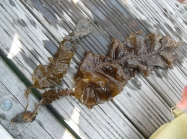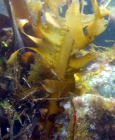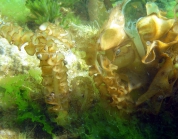BeRMS taxon details
Undaria pinnatifida (Harvey) Suringar, 1873
145721 (urn:lsid:marinespecies.org:taxname:145721)
accepted
Species
Alaria pinnatifida Harvey, 1860 · unaccepted
marine
(of Alaria pinnatifida Harvey, 1860) Harvey, W. H. (1860). Characters of new algae, chiefly from Japan and adjacent regions, collected by Charles Wright in the North Pacific Exploring Expedition under Captain James Rodgers. <em>Proceedings of the American Academy of Arts and Sciences.</em> 4: 327-335.
page(s): 329 [details]
page(s): 329 [details]
BeRMS (2021). Undaria pinnatifida (Harvey) Suringar, 1873. Accessed at: http://www.marinespecies.org/berms/aphia.php?p=taxdetails&id=145721 on 2024-05-10
VLIZ Belgian Marine Species Consortium (2010 onwards). Belgian Register of Marine Species. Undaria pinnatifida (Harvey) Suringar, 1873. Accessed at: https://marinespecies.org/berms/aphia.php?p=taxdetails&id=145721 on 2024-05-10
Date
action
by
Copyright notice: the information originating from AlgaeBase may not be downloaded or replicated by any means, without the written permission of the copyright owner (generally AlgaeBase). Fair usage of data in scientific publications is permitted.
original description
(of Alaria pinnatifida Harvey, 1860) Harvey, W. H. (1860). Characters of new algae, chiefly from Japan and adjacent regions, collected by Charles Wright in the North Pacific Exploring Expedition under Captain James Rodgers. <em>Proceedings of the American Academy of Arts and Sciences.</em> 4: 327-335.
page(s): 329 [details]
context source (Introduced species) Katsanevakis, S.; Bogucarskis, K.; Gatto, F.; Vandekerkhove, J.; Deriu, I.; Cardoso A.S. (2012). Building the European Alien Species Information Network (EASIN): a novel approach for the exploration of distributed alien species data. <em>BioInvasions Records.</em> 1: 235-245., available online at http://easin.jrc.ec.europa.eu [details] Available for editors
context source (Schelde) (2010). Bedreiging voor biodiversiteit. Indicatoren voor het Schelde-estuarium. <em>Opgemaakt in opdracht van Afdeling Maritieme Toegang, projectgroep EcoWaMorSe, Vlaams Nederlandse Scheldecommissie. VLIZ Information Sheets, 200. Vlaams Instituut voor de Zee (VLIZ): Oostende.</em> 7 pp. (look up in IMIS) [details]
basis of record Guiry, M.D. (2001). Macroalgae of Rhodophycota, Phaeophycota, Chlorophycota, and two genera of Xanthophycota, <B><I>in</I></B>: Costello, M.J. <i>et al.</i> (Ed.) (2001). <i>European register of marine species: a check-list of the marine species in Europe and a bibliography of guides to their identification. Collection Patrimoines Naturels,</i> 50: pp. 20-38 (look up in IMIS) [details]
additional source Muller, Y. (2004). Faune et flore du littoral du Nord, du Pas-de-Calais et de la Belgique: inventaire. [Coastal fauna and flora of the Nord, Pas-de-Calais and Belgium: inventory]. <em>Commission Régionale de Biologie Région Nord Pas-de-Calais: France.</em> 307 pp., available online at http://www.vliz.be/imisdocs/publications/145561.pdf [details]
additional source Streftaris, N., A. Zenetos & E. Papathanassiou. (2005). Globalisation in marine ecosystems: the story of non-indigenous marine species across European seas. <em>Oceanogry and Marine Biology: an Annual Review.</em> 43: 419-453. (look up in IMIS) [details] Available for editors
additional source Zenetos, A.; Çinar, M.E.; Pancucci-Papadopoulou, M.A.; Harmelin, J.-G.; Furnari, G.; Andaloro, F.; Bellou, N.; Streftaris, N.; Zibrowius, H. (2005). Annotated list of marine alien species in the Mediterranean with records of the worst invasive species. <em>Mediterranean Marine Science.</em> 6 (2): 63-118., available online at https://www.researchgate.net/publication/273213810_Annotated_list_of_marine_alien_species_in_the_Mediterranean_with_records_of_the_worst_invasive_species [details] Available for editors
additional source Occhipinti-Ambrogi, A., A. Marchini, G. Cantone, A. Castelli, C. Chimenz, M. Cormaci, C. Froglia, G. Furnari, M.C. Gambi, G. Giaccone, A. Giangrande, C. Gravil, F. Mastrototaro, C. Mazziotti, L. Orsi-Relini & S. Piraino. (2010). Alien species along the Italian coasts: an overview. <em>Biological Invasions.</em> 13(1): 215-237., available online at https://doi.org/10.1007/s10530-010-9803-y [details] Available for editors
additional source Liu, J.Y. [Ruiyu] (ed.). (2008). Checklist of marine biota of China seas. <em>China Science Press.</em> 1267 pp. (look up in IMIS) [details] Available for editors
additional source Zenetos, A.; Gofas, S.; Verlaque, M.; Cinar, M.; Garcia Raso, J.; Bianchi, C.; Morri, C.; Azzurro, E.; Bilecenoglu, M.; Froglia, C.; Siokou, I.; Violanti, D.; Sfriso, A.; San Martin, G.; Giangrande, A.; Katagan, T.; Ballesteros, E.; Ramos-Espla, A.; Mastrototaro, F.; Ocana, O.; Zingone, A.; Gambi, M.; Streftaris, N. (2010). Alien species in the Mediterranean Sea by 2010. A contribution to the application of European Union's Marine Strategy Framework Directive (MSFD). Part I. Spatial distribution. <em>Mediterranean Marine Science.</em> 11(2): 381-493., available online at https://doi.org/10.12681/mms.87 [details]
additional source Broady, P.A.; Flint, E.A.; Nelson, W.A.; Cassie Cooper, V.; De Winton, M.D.; Novis, P.M. (2012). Phylum Chlorophyta and Charophyta: green algae, in: Gordon, D.P. (Ed.) (2012). New Zealand inventory of biodiversity: 3. Kingdoms Bacteria, Protozoa, Chromista, Plantae, Fungi. pp. 347-381. [details]
additional source Eno, N. C.; Clark, R. A.; Sanderson, W. G. (1997). Non-native marine species in British waters: a review and directory. <em>Joint Nature Conservation Committee, Peterborough.</em> pp. 136. (look up in IMIS) [details] Available for editors
additional source Lutaenko, K.A.; Furota, T.; Nakayama; S.; Shin, K.; Xu, J. (2013). Atlas of Marine Invasive Species in the NOWPAP Region. Beijing: NOWPAP DINRAC (Northwest Pacific Action Plan, Data and Information Network Regional Center). 189 pp. [details]
additional source Marchini, A., J. Ferrario, A. Sfriso & A. Occhipinti-Ambrogi. (2015). Current status and trends of biological invasions in the Lagoon of Venice, a hotspot of marine NIS introductions in the Mediterranean Sea. <em>Biological Invasions.</em> 17:2943–2962., available online at https://doi.org/10.1007/s10530-015-0922-3 [details] Available for editors
additional source Verlaque, M.; Ruitton, S.; Mineur, F.; Boudouresque, C.-F. (2007). CIESM Atlas of Exotic Macrophytes in the Mediterranean Sea. <em>Rapport de la Commission de l'Exploration de la mer Méditerranée, Monaco.</em> 38., available online at http://www.ciesm.org/atlas/appendix4.html#top [details] Available for editors
additional source Mollo, E.; Cimino, G.; Ghiselin, M. T. (2014). Alien biomolecules: a new challenge for natural product chemists. <em>Biological Invasions.</em> 17(3): 941-950., available online at https://doi.org/10.1007/s10530-014-0835-6
note: We show how a kind of chemical data originally gathered for other objectives—such as obtaining drugs from the sea—might also offer valid alternatives to unrealistic eradication campaigns, becoming...
[details] Available for editors 
additional source Guiry, M.D. & Guiry, G.M. (2023). AlgaeBase. <em>World-wide electronic publication, National University of Ireland, Galway.</em> searched on YYYY-MM-DD., available online at http://www.algaebase.org [details]
status source Lin, Y.; Gao, Z.; Zhan, A. (2015). Introduction and use of non-native species for aquaculture in China: status, risks and management solutions. <em>Reviews in Aquaculture.</em> 7(1): 28-58., available online at https://doi.org/10.1111/raq.12052 [details]
page(s): 329 [details]
context source (Introduced species) Katsanevakis, S.; Bogucarskis, K.; Gatto, F.; Vandekerkhove, J.; Deriu, I.; Cardoso A.S. (2012). Building the European Alien Species Information Network (EASIN): a novel approach for the exploration of distributed alien species data. <em>BioInvasions Records.</em> 1: 235-245., available online at http://easin.jrc.ec.europa.eu [details] Available for editors
context source (Schelde) (2010). Bedreiging voor biodiversiteit. Indicatoren voor het Schelde-estuarium. <em>Opgemaakt in opdracht van Afdeling Maritieme Toegang, projectgroep EcoWaMorSe, Vlaams Nederlandse Scheldecommissie. VLIZ Information Sheets, 200. Vlaams Instituut voor de Zee (VLIZ): Oostende.</em> 7 pp. (look up in IMIS) [details]
basis of record Guiry, M.D. (2001). Macroalgae of Rhodophycota, Phaeophycota, Chlorophycota, and two genera of Xanthophycota, <B><I>in</I></B>: Costello, M.J. <i>et al.</i> (Ed.) (2001). <i>European register of marine species: a check-list of the marine species in Europe and a bibliography of guides to their identification. Collection Patrimoines Naturels,</i> 50: pp. 20-38 (look up in IMIS) [details]
additional source Muller, Y. (2004). Faune et flore du littoral du Nord, du Pas-de-Calais et de la Belgique: inventaire. [Coastal fauna and flora of the Nord, Pas-de-Calais and Belgium: inventory]. <em>Commission Régionale de Biologie Région Nord Pas-de-Calais: France.</em> 307 pp., available online at http://www.vliz.be/imisdocs/publications/145561.pdf [details]
additional source Streftaris, N., A. Zenetos & E. Papathanassiou. (2005). Globalisation in marine ecosystems: the story of non-indigenous marine species across European seas. <em>Oceanogry and Marine Biology: an Annual Review.</em> 43: 419-453. (look up in IMIS) [details] Available for editors
additional source Zenetos, A.; Çinar, M.E.; Pancucci-Papadopoulou, M.A.; Harmelin, J.-G.; Furnari, G.; Andaloro, F.; Bellou, N.; Streftaris, N.; Zibrowius, H. (2005). Annotated list of marine alien species in the Mediterranean with records of the worst invasive species. <em>Mediterranean Marine Science.</em> 6 (2): 63-118., available online at https://www.researchgate.net/publication/273213810_Annotated_list_of_marine_alien_species_in_the_Mediterranean_with_records_of_the_worst_invasive_species [details] Available for editors
additional source Occhipinti-Ambrogi, A., A. Marchini, G. Cantone, A. Castelli, C. Chimenz, M. Cormaci, C. Froglia, G. Furnari, M.C. Gambi, G. Giaccone, A. Giangrande, C. Gravil, F. Mastrototaro, C. Mazziotti, L. Orsi-Relini & S. Piraino. (2010). Alien species along the Italian coasts: an overview. <em>Biological Invasions.</em> 13(1): 215-237., available online at https://doi.org/10.1007/s10530-010-9803-y [details] Available for editors
additional source Liu, J.Y. [Ruiyu] (ed.). (2008). Checklist of marine biota of China seas. <em>China Science Press.</em> 1267 pp. (look up in IMIS) [details] Available for editors
additional source Zenetos, A.; Gofas, S.; Verlaque, M.; Cinar, M.; Garcia Raso, J.; Bianchi, C.; Morri, C.; Azzurro, E.; Bilecenoglu, M.; Froglia, C.; Siokou, I.; Violanti, D.; Sfriso, A.; San Martin, G.; Giangrande, A.; Katagan, T.; Ballesteros, E.; Ramos-Espla, A.; Mastrototaro, F.; Ocana, O.; Zingone, A.; Gambi, M.; Streftaris, N. (2010). Alien species in the Mediterranean Sea by 2010. A contribution to the application of European Union's Marine Strategy Framework Directive (MSFD). Part I. Spatial distribution. <em>Mediterranean Marine Science.</em> 11(2): 381-493., available online at https://doi.org/10.12681/mms.87 [details]
additional source Broady, P.A.; Flint, E.A.; Nelson, W.A.; Cassie Cooper, V.; De Winton, M.D.; Novis, P.M. (2012). Phylum Chlorophyta and Charophyta: green algae, in: Gordon, D.P. (Ed.) (2012). New Zealand inventory of biodiversity: 3. Kingdoms Bacteria, Protozoa, Chromista, Plantae, Fungi. pp. 347-381. [details]
additional source Eno, N. C.; Clark, R. A.; Sanderson, W. G. (1997). Non-native marine species in British waters: a review and directory. <em>Joint Nature Conservation Committee, Peterborough.</em> pp. 136. (look up in IMIS) [details] Available for editors
additional source Lutaenko, K.A.; Furota, T.; Nakayama; S.; Shin, K.; Xu, J. (2013). Atlas of Marine Invasive Species in the NOWPAP Region. Beijing: NOWPAP DINRAC (Northwest Pacific Action Plan, Data and Information Network Regional Center). 189 pp. [details]
additional source Marchini, A., J. Ferrario, A. Sfriso & A. Occhipinti-Ambrogi. (2015). Current status and trends of biological invasions in the Lagoon of Venice, a hotspot of marine NIS introductions in the Mediterranean Sea. <em>Biological Invasions.</em> 17:2943–2962., available online at https://doi.org/10.1007/s10530-015-0922-3 [details] Available for editors
additional source Verlaque, M.; Ruitton, S.; Mineur, F.; Boudouresque, C.-F. (2007). CIESM Atlas of Exotic Macrophytes in the Mediterranean Sea. <em>Rapport de la Commission de l'Exploration de la mer Méditerranée, Monaco.</em> 38., available online at http://www.ciesm.org/atlas/appendix4.html#top [details] Available for editors
additional source Mollo, E.; Cimino, G.; Ghiselin, M. T. (2014). Alien biomolecules: a new challenge for natural product chemists. <em>Biological Invasions.</em> 17(3): 941-950., available online at https://doi.org/10.1007/s10530-014-0835-6
note: We show how a kind of chemical data originally gathered for other objectives—such as obtaining drugs from the sea—might also offer valid alternatives to unrealistic eradication campaigns, becoming...
We show how a kind of chemical data originally gathered for other objectives—such as obtaining drugs from the sea—might also offer valid alternatives to unrealistic eradication campaigns, becoming the basis for a desirable commercial use of the bioactive compounds obtainable from marine pests, thus paving the way for making the control of invasions profitable. The pests might then be harvested, reducing their impact on marine ecosystems.
additional source Guiry, M.D. & Guiry, G.M. (2023). AlgaeBase. <em>World-wide electronic publication, National University of Ireland, Galway.</em> searched on YYYY-MM-DD., available online at http://www.algaebase.org [details]
status source Lin, Y.; Gao, Z.; Zhan, A. (2015). Introduction and use of non-native species for aquaculture in China: status, risks and management solutions. <em>Reviews in Aquaculture.</em> 7(1): 28-58., available online at https://doi.org/10.1111/raq.12052 [details]
 Present
Present  Inaccurate
Inaccurate  Introduced: alien
Introduced: alien  Containing type locality
Containing type locality
| Language | Name | |
|---|---|---|
| Dutch | wakameJapanse kelp | [details] |
| English | wakame | [details] |
| French | wakamé | [details] |
| German | Wakame | [details] |
Global invasive species database - Undaria pinnatifida
Marine Life Information Network - UK
Published in AlgaeBase
Published in AlgaeBase (from synonym Alaria pinnatifida Harvey, 1860)
(from synonym Alaria pinnatifida Harvey, 1860)
To Barcode of Life (10 barcodes)
To Biodiversity Heritage Library (20 publications) (from synonym Alaria pinnatifida Harvey, 1860)
To Biodiversity Heritage Library (41 publications)
To European Nucleotide Archive (ENA)
To GenBank (57629 nucleotides; 1397 proteins)
To Global Invasive Species Database (GISD)
To Information system on Aquatic Non-Indigenous and Cryptogenic Species (AquaNIS)
To Niet-inheemse soorten Belgisch deel Noordzee en aanpalende estuaria (in Dutch)
To PESI
Marine Life Information Network - UK
Published in AlgaeBase

Published in AlgaeBase
 (from synonym Alaria pinnatifida Harvey, 1860)
(from synonym Alaria pinnatifida Harvey, 1860)To Barcode of Life (10 barcodes)
To Biodiversity Heritage Library (20 publications) (from synonym Alaria pinnatifida Harvey, 1860)
To Biodiversity Heritage Library (41 publications)
To European Nucleotide Archive (ENA)
To GenBank (57629 nucleotides; 1397 proteins)
To Global Invasive Species Database (GISD)
To Information system on Aquatic Non-Indigenous and Cryptogenic Species (AquaNIS)
To Niet-inheemse soorten Belgisch deel Noordzee en aanpalende estuaria (in Dutch)
To PESI




